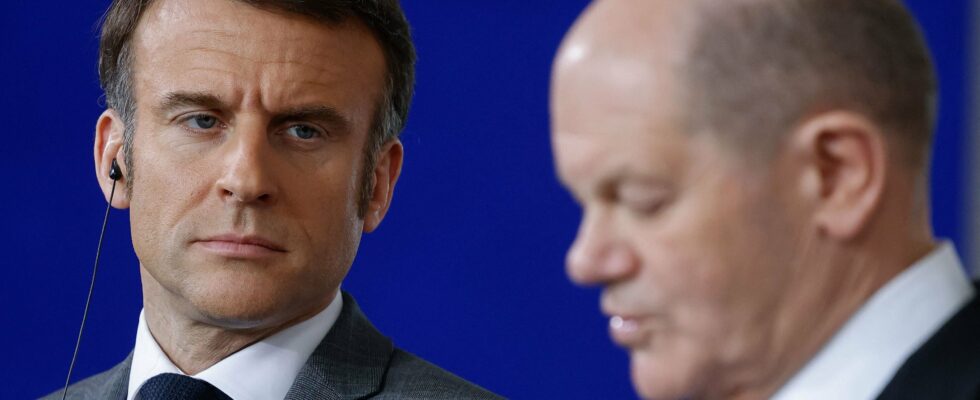If the war in Ukraine has illustrated like never before the differences between France and Germany, the same war also forces the two countries to think like never before about their obligation to come together on the themes which divide them the most, in particular defense . The rare and subtle modulations of the face of Olaf Scholz, aptly nicknamed “Scholzomat” as he seems devoid of affect, can serve as an ambient thermometer.
On February 26 at the Elysée, at the end of the Paris conference where Emmanuel Macron announced without consultation that the sending of Western “ground troops” to Ukraine could not be ruled out, the scathing coldness of Scholzomat seemed having reached a point of no return. On May 28 in Germany, ahead of the Franco-German council of ministers in Meseberg, it was the opposite. Olaf looked at Emmanuel, smiling. He seemed almost enthusiastic.
However, the president then took an important step by declaring that the weapons delivered by France to Ukraine could strike military sites on Russian territory. The German chancellor remained cautious, but he approved, without even waiting for Joe Biden’s announcement of a similar decision three days later.
While he still opposes the delivery of Taurus missiles to Ukraine, he left open the possibility that less powerful weapons could target sites in Russia. “It must be said clearly: [l’Ukraine] is attacked and can defend itself”, declared Olaf Scholz, invoking “international law”. France, this time, took tweezers to reassure him: “It is not a question of a change of strategy, but of “an adaptation to the Russian mode of aggression”, indicates an Elysian source. If the chancellor refuses to send soldiers to Ukraine, he also did not object to instructors being sent there as part of a coalition of countries led by France, which already unofficially has special forces there.
The German president played the anti-Scholtz
This moment of Emmanuel Macron’s visit to Germany marks further progress, not only in aid to Ukraine, but also in the appeasement of a Franco-German tandem whose incompatibilities the war revealed. The state visit which preceded the Meseberg council of ministers, the first by a French president to Germany since that of Jacques Chirac in 2000, put oil in the wheels. President Frank-Walter Steinmeier clearly played the anti-Scholz role to compensate for the image of a Germany reluctant to move towards the European “strategic autonomy” dear to the French head of state. He even thanked Emmanuel Macron for his “visionary ideas”, those which have the gift of exasperating a pacifist Germany where industry takes precedence over geopolitics: “You are trying to make us come out of our reserve.”
In terms of strategic culture and defense, the main issue of the moment, the subjects of discord and irritation remain deep around three axes: the common budget, always, but also the relationship with NATO and the battle of leadership for the European security. Post-war Germany, which owes its democratic identity, its reunification and its defense to the United States, is wary of “European strategic autonomy” if it undermines the Atlantic Alliance. On top of this fundamental divergence is a battle for leadership, while Germany is investing massively in a defense that was previously non-existent, and France has become, since Brexit, the only power in the European Union to have nuclear deterrence and a seat on the UN Security Council. Emmanuel Macron suggests extending French deterrence to Europe, Olaf Scholz cannot trust this and wishes to think about shared leadership.
On the basis of this fundamental divide, and moreover when the French and German leaders do not agree, diplomacy can only proceed in very small steps. The lack of historical progress, the persistent irritations and the repeated breakdowns of the Franco-German engine do not exclude the steps taken, measured with symbols, weak signals, and with a double objective, clearly shared: defense European common and support for Ukraine “as long as necessary” Very little, very late.
* Marion van Renterghem is a senior reporter, winner of the Albert-Londres prize and author of “Piège Nord Stream” (Arènes)
.
